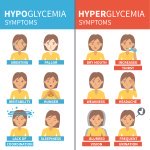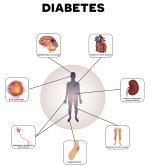Early Diabetes Symptoms

Here are early diabetes symptoms you need to know about to protect your health. Called a “silent killer”, type 2 diabetes has easy-to-miss signs that, while often dismissed as benign, can have serious negative consequences for your health. A 2007 study found that around two-thirds of all patients admitted to the emergency room with heart attacks had per-diabetes or undiagnosed diabetes. (1) In addition, studies indicate that early detection and blood sugar management will decrease your chances of developing complications. (2)
Common Early Diabetes Symptoms
Type 2 Diabetes
- Increased urination
- Excessive thirst or appetite
- Unusual weight gain or loss
- Unexplained fatigue or irritability
- Trouble having sex
- Blurred vision
- Itchy skin, especially in the groin or vaginal area
- Yeast infections/ vaginal infections / Jock Itch / Athlete’s Foot
- Sore or dry mouth
- Slow healing sores and cuts
- Numbness or tingling in your feet and hands
- Tendon problems, especially frozen shoulder and carpal tunnel syndrome
Common Early Diabetes Symptoms
Type 1 Diabetes
- Unexplained weight loss
- Breath smells like acetone (nail polish remover)
- Unexplained fatigue or fuzzy thinking
- Abdominal pain, nausea or vomiting
Early Diabetes Symptoms Explained
While the development of type 1 diabetes is usually sudden and dramatic, the symptoms of type 2 diabetes often come on slowly, making it hard to detect until substantial damage is already done to your health. Some examples of this include stroke, heart disease, dementia and cancer (3) as well as depression and mood disorders (4)
Increased urination
Have you noticed that you have to visit the bathroom to urinate as frequently as every couple hours? Diabetes is a condition marked by high blood sugar levels. Your body tries to get rid of excess sugar by pulling water out of your cells and flushing the sugar out of your body in your urine. This is the most common of the early diabetes symptoms.
Excessive thirst or appetite
Have you noticed that you are constantly thirsty? When your body eliminates the extra sugar in your body with increased urination, the water must come from somewhere. You can quickly get dehydrated if you are not drinking plenty of water to replace that water your body is pulling out of your tissues.
Constant hunger is a sign that your body is having trouble processing sugar. Excess insulin stimulates hunger. When insulin levels are high in your body, due to either insulin resistance or to deal with a high carbohydrate diet, you will be constantly hungry. This is one of the most overlooked early diabetes symptoms
Unusual weight gain or loss
If your body is having trouble transporting sugar out of your blood and into the cells of your body, then two things can happen. Often it will store the excess sugar in fat cells, causing you to gain weight. Additionally your insulin levels will rise which also can cause weight gain. On the other hand, if your body is insulin resistant, then the cells of your body may not let insulin shepherd the insulin out of your blood and into your cells where it can be used for energy. This can cause both weight loss and fatigue.
Unexplained Fatigue or irritability
Are you feeling constantly wiped out or suddenly irritable? If your body is having trouble shuttling glucose into cells where the mitocondria can use it for energy, you will become fatigued. Often, running out of energy and irritability go hand in hand. Lack of interest and trouble concentrating are also ways in which fatigue may effect you since your brain is one of the major consumers of glucose. Of the early diabetes symptoms, this is the one that you are most likely to have trouble recognizing in yourself.
Trouble having sex
Men, are you having trouble achieving erections? Women, are you having trouble reaching orgasm? High blood sugar and high insulin levels can cause nerve damage which impedes sexual response. For men this means trouble achieving erections. In women it can cause reduced vaginal sensitivity. In addition high insulin levels gum up your circulation causing the same sorts of sexual response issues. Women may also start having pain during sexual intercourse due to reduced vaginal lubrication. Of the early diabetes symptoms, this is the one you are most likely to have trouble asking about.
Blurred vision
Are you suddenly having trouble reading? Do your eyes feel tired? When your blood sugar levels rise, the sugar enters the fluid in your eyeballs and changes their optical properties making it hard to focus. A larger concern is if you develop Retinopathy due to undiagnosed high blood sugar levels. Retinopathy has no symptoms and you can develop it without first having blurry vision due to high blood sugar levels.
If your blood sugars are high they will also cause the tiny blood vessels of the retinal to start growing in a disordered manner. These unhealthy vessels eventually burst, releasing blood into your eye. Ultimately, these overgrown vessels destroy your optic nerve’s ability to transmit images to your brain, resulting in permanent blindness.
One study of a large population found that there were retinopathic changes in the eyes of one out of every twelve people diagnosed with pre-diabetes. (5) A meta-study based on the records of 44,623 participants found that the prevalence of diabetic retinopathy rose significantly when fasting blood sugars rose to around 120 mg/dL and two hour glucose tolerance test results were around 180 mg/dL. (6)
Itchy skin, especially in the groin or vaginal area
Do you have dry flaky skin skin? This can be caused by dehydration as well as excess yeast. Athletes foot as well as “jock itch” are both fungal infections caused by excess yeast.
Yeast Infections - vaginal & bladder infections
Yeast feeds on sugar so when you regularly have excess sugar in your blood it will cause your gut, bladder and vagina (women) to have excess yeast. In addition, sugar suppresses your immune system (especially T-cells), making it harder for your body to recover from infections.
Sore or dry mouth
Is your mouth sore? Do your gums hurt? Do your gums bleed when you brush your teeth? Dehydration due to excess blood sugar can cause your mouth to be dry. When your blood sugar levels are too high it may cause your gums to swell and become very tender. Another related symptom is your gums will pull away from your teeth. So if your dentist tells you that you have gum recession, it may be due to diabetes.
Slow healing sores and cuts
Are you constantly bruised? Do your cuts take forever to heal? High blood sugar and high insulin levels gum up small blood vessels and inhibit your bodies natural repair processes.
Numbness or tingling in your feet and hands
This is one of the most commonly noticed early diabetes symptoms. If you notice your feet tingling or feel like there is something stuck between your toes, you may be developing diabetes. High insulin levels gum up the tiny blood vessels that feed the nerves in your body. Studies show that blood sugar levels over 140 mg/dL for more than two hours cause peripheral nerve damage. More than half of the people diagnosed with type 2 diabetes already have detectable neuropathy. (7)
Tendon Problems
Research suggests that both frozen shoulder and carpal tunnel syndrome may be the first symptom of high blood sugars. One study found that a diagnosis of carpel tunnel syndrom typically ocured ten years before a formal diagnosis of diabetes. (8)
References
(1) Jessani S, et al. Should oral glucose tolerance testing be mandatory following acute myocardial infarction? Int J Clin Pract. 2007 Apr; 61( 4): 680– 83.
(2) DCCT and EDIC: The Diabetes Control and Complications Trial and Follow-up Study
http://diabetes.niddk.nih.gov/dm/pubs/control/
(3) http:// apps.nccd.cdc.gov/ DDTSTRS/ FactSheet.aspx (National Diabetes Fact Sheet 2007)
(4) Pan A, et al. Bidirectional association between depression and type 2 diabetes mellitus in women. Arch Intern Med. 2010 Nov 22;170( 21): 1884– 91
(5) ADA Scientific Sessions: Retinopathy Found in Prediabetes. Elizabeth Thompson Beckley. DOC News. August 1, 2005. Volume 2 Number 8 p. 1
(6) Association of A1C and Fasting Plasma Glucose Levels With Diabetic Retinopathy Prevalence in the U.S. Population: Implications for diabetes diagnostic thresholds Yiling J. Cheng et al. Diabetes Care November 2009 vol. 32 no. 11 2027-2032. doi: 10.2337/dc09-0440
(7) The Spectrum of Neuropathy in Diabetes and Impaired Glucose Tolerance. J. Sumner et al. Neurology 2003;60:108-111
(8) Gulliford, M. Diabetes Care, August 2006; vol 29: pp 1929-1930. Reuters. WebMd Article



New! Facebook Comments
What do you think? Share your thoughts below...